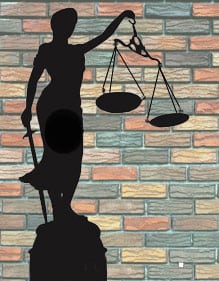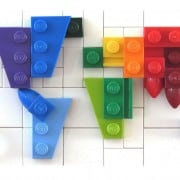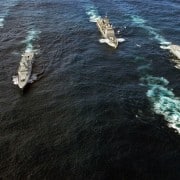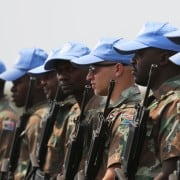|
Getting your Trinity Audio player ready...
|
Rule of law: the absolute predominance of regular law, so that the government has no arbitrary authority over the citizen; the equal subjection of all (including officials) to the ordinary law administered by the ordinary courts; and the fact that the citizen’s personal freedoms are formulated and protected by the ordinary law rather than by abstract constitutional declarations. (Oxford Reference)
Rule of law, therefore, implies that every citizen is subject to the law – including those at the very top. In South Africa, many citizens would say that this is simply not the case, and that certainly all are not equal under the law. Since the latter statement is one of the core principles of South Africa’s Freedom Charter, the fact that it is (often deviously) side-stepped is cause for great concern.
The World Justice Project, a non-profit organisation committed to advancing the rule of law around the world, released its 2015 Rule of Law Index in June. The index, which uses information drawn from over 100 000 household and expert surveys from many countries, measures how the rule of law is experienced by the general public in everyday life around the world. This year’s is the fifth edition.
 South Africa is one of the 102 countries assessed in this year’s index. On a scale of 0 to 1, where 0 is worst and 1 is best, the country scored an unexceptional 0.58, which gives it a global ranking of 36. In the sub-Saharan Africa region South Africa was ranked third, after Botswana (0.64) and Ghana (0.60), ranked at 31 and 34 respectively. It was followed by Senegal (0.57) and Malawi (0.50), ranked at 38 and 61 respectively.
South Africa is one of the 102 countries assessed in this year’s index. On a scale of 0 to 1, where 0 is worst and 1 is best, the country scored an unexceptional 0.58, which gives it a global ranking of 36. In the sub-Saharan Africa region South Africa was ranked third, after Botswana (0.64) and Ghana (0.60), ranked at 31 and 34 respectively. It was followed by Senegal (0.57) and Malawi (0.50), ranked at 38 and 61 respectively.
The index uses 44 indicators which are grouped around the following eight factors –
- Constraints on Government Powers
- Absence of Corruption
- Order and Security
- Fundamental Rights
- Open Government
- Regulatory Enforcement
- Civil Justice
- Criminal Justice
A ninth factor, informal justice, is measured but not included in aggregated scores and rankings.
South African media veteran Mondli Makhanya sits on the board of directors of the WJP, and the organisation counts Archbishop Emeritus Desmond Tutu and retired judge Richard Goldstone among its honorary chairpersons.
South Africa could do much better
South Africa scored in the top tercile in only two of its eight categories – these are Open Government and Regulatory Enforcement. It was placed in the middle tercile for five categories, and was in the bottom tercile for the last category, Order and Security. All in all, a thoroughly mediocre showing.
The table below gives details on South Africa’s performance in the eight main categories.
| Category and (rank) | Description |
| Constraints on Government Powers (40) |
The Constraints on Government Powers factor measures the effectiveness of the institutional checks on government power by the legislature, the judiciary, and independent auditing and review agencies.South Africa’s low capacity for imposing sanctions for official government misconduct was its weakest link in this category. The country scored highest for its independent government watch-dogs. |
| Absence of Corruption (42) | The Absence of Corruption factor measures the degree of corruption in government, and considers three forms of corruption: bribery, improper influence by public or private interests, and misappropriation of public funds or other resources.South Africa’s average performance in this indicator was not worse only because it fared well at keeping corruption out of the judiciary. Corruption in the police, legislature and executive branch dragged the ranking down. |
| Open Government (27) | The Open Government factor measures whether basic laws and information in legal rights are publicised, and assesses the quality of information published by the government.South Africa rated well for its civic participation in government, but was found wanting in the way government publicised laws and other government data. |
| Fundamental Rights (39) | The Fundamental Rights factor measures the protection of human rights, including the right to life and security, freedom of belief and expression, freedom of assembly and association as well as labour rights, among others.South Africa’s performance in this category was better than in any other. Its weakest indicator was the due process of the law. Freedom of expression, religion and association were the strongest factors. |
| Order and Security (83) | The Order and Security factor measures various threats to order and security including conventional crime, political violence, and violence as a means to redress personal grievancesSouth Africa’s only saving grace in this category was the absence of civil conflict, where it scored top marks. High crime rates and violence knocked it down to 10 of 18 countries in the region, and 81 out of 102 countries overall. |
| Regulatory Enforcement (33) | The Regulatory Enforcement factor measures the extent to which regulations are effectively implemented and enforced without improper influence by public officials or private interests.South Africa performed quite well in this category, but fell short because of unreasonable delays in regulatory processes. |
| Civil Justice (39) | The Civil Justice factor measures whether civil justice systems are accessible and affordable, free of discrimination, corruption, and improper influence by public officials.South Africa scored well for having a civil justice system with low levels of corruption and government influence. It didn’t fare as well in terms of affordability, absence of discrimination or effective enforcement, but did better in accessibility of alternate dispute resolution. |
| Criminal Justice (38) | The Criminal Justice factor measures whether the criminal investigation, adjudication, and correctional systems are effective, and impartial, free of corruption, free of improper influence, and protective of due process and the rights of the accused.South Africa was let down by the correctional system’s lack of effectiveness in reducing criminal behaviour. It also scored low on effectiveness of both the criminal adjudication system and the criminal investigation system, and put up an average performance in the rest of the indicators. |
Defining Rule of Law
The WJP views the rule of law as a rules-based system in which the following four universal principles are upheld:
- The government and its officials and agents are accountable under the law;
- The laws are clear, publicised, stable, fair, and protect fundamental rights, including the security of persons and property;
- The process by which the laws are enacted, administered, and enforced is accessible, fair, and efficient;
- Access to justice is provided by competent, independent, and ethical adjudicators, attorneys or representatives, and judicial officers who are of sufficient number, have adequate resources, and reflect the makeup of the communities they serve.
Its Rule of Law index measures how countries adhere to the rule of law in practice.
“Effective rule of law reduces corruption, combats poverty and disease, and protects people from injustices and dangers large and small,” the report notes. “It is the foundation for communities of peace, opportunity, and equity — underpinning development, accountable government, and respect for fundamental rights.”
Where the rule of law is weak, said WJP, medicines fail to reach health facilities, criminal violence goes unchecked, laws are applied unequally across societies, and foreign investments are held back.
Rule of law is the foundation for communities of peace, opportunity, and equity, as it underpins development, accountable government, and respect for fundamental rights.







